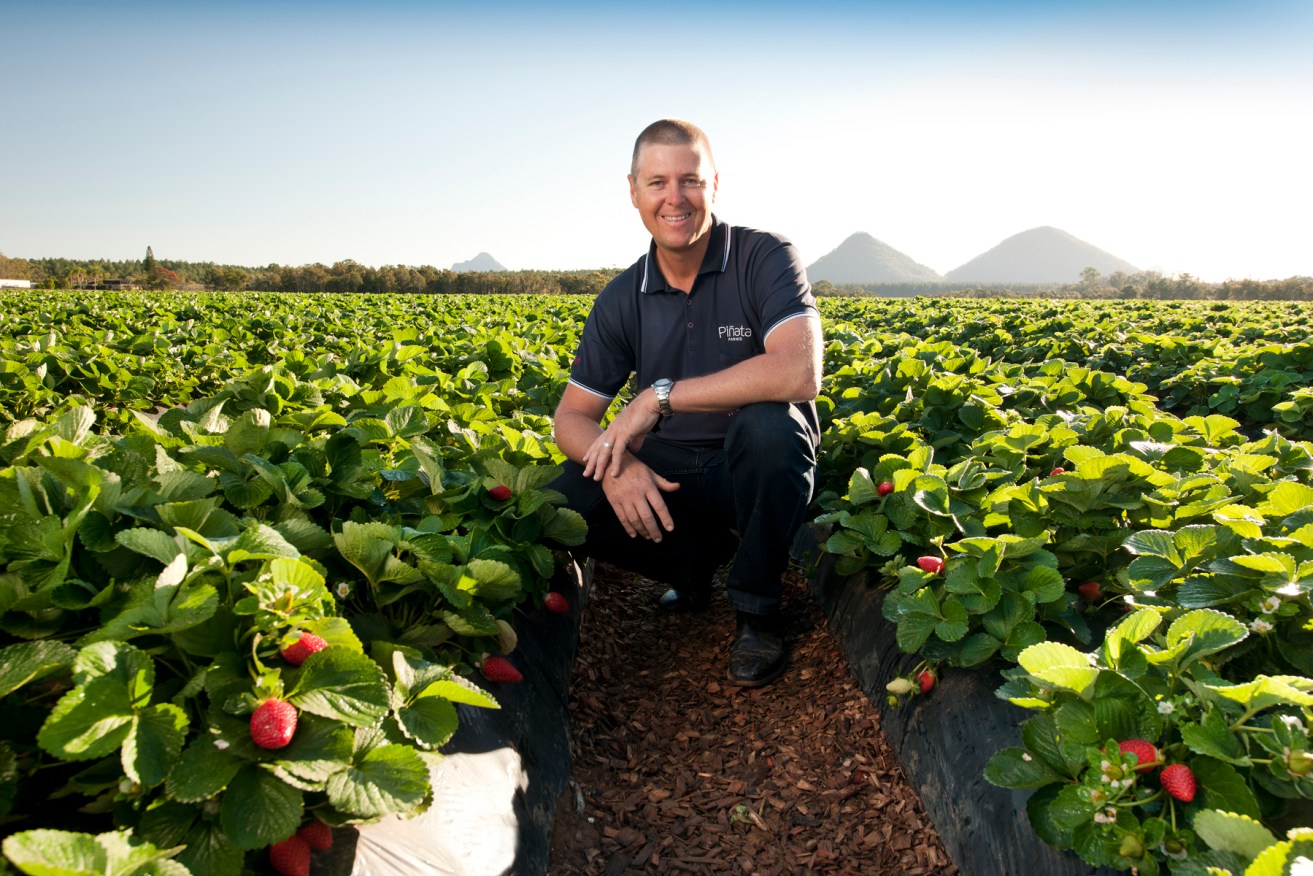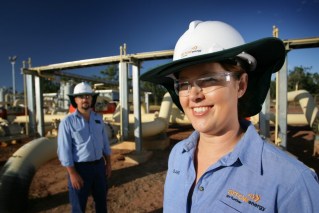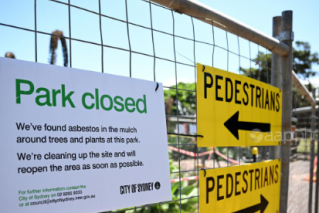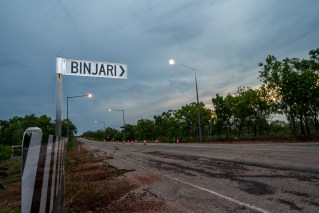Temporary visas a pick-me-up for start of strawberry season
Coronavirus chills threatened to freeze the harvesting of Queensland crops this year, but down on the farm, workers are ready to pick the state’s best produce – as long as they keep their distance.


Pinata Farms managing director Gavin Scurr on his Wamuran strawberry farm north of Brisbane.
The first blast of cooler weather expected this weekend heralds the approach of Queensland’s strawberry season, which has the director of one of Australia’s largest horticulture operations sitting more comfortably than he was a month ago.
With plants in the ground and ready for harvest next month on his Wamuran farm near Brisbane, Gavin Scurr is thankful for the Federal government’s temporary visa changes announced earlier this month, which will allow growers to secure seasonal workers and continue supplying essential fresh produce.
Scurr, the managing director of Pinata Farms, one of Australia’s biggest horticulture enterprises, is also a key player in the Australian Fresh Produce Alliance, a national industry lobby group that led crucial negotiations with the Morrison Government in response to COVID-19 restrictions.
One month ago Australia was facing an avalanche of unknowns as new COVID-19 cases continued to spike, shoppers rushed to panic-buy food and fears escalated that disrupted food supply chains would be unable to cope.
Compounding the concerns were the impact of travel restrictions on overseas workers, who flock to Australia’s farms in their thousands for seasonal harvest work.
This “backpacker” workforce remains the labour backbone of a multi-billion dollar industry, underpinning production for domestic and export markets.
“Growers were seriously under threat of not being able to harvest their crops,” Scurr said.
“The temporary changes mean we can continue to provide fresh food for Australian consumers.”
Pinata Farms, which also has pineapple and mango operations in Mareeba in North Queensland and near Darwin, traditionally relies on a seasonal workforce of backpackers to pick and pack strawberries from May to October.
Up to 500 people are employed during this time, with the season peaking in August. It also produces raspberries in Queensland and Tasmania and is scheduled to begin its Sunshine Coast harvest in coming days.
Pinata’s annual seasonal workforce also includes about 50 workers from Vanuatu recruited under the Federal Government’s Seasonal Worker Programme.
“Backpackers who lost their jobs in hospitality and tourism on the Sunshine Coast in mid-March were effectively adrift – unemployed, unable to return home due to travel restrictions, and facing the prospect of their visas expiring before the winter strawberry harvest began,” Scurr said.
“The changes meant they were eligible for visa extensions and exempt from the six-month limitation with one employer, allowing them to be redeployed into essential farm work.”
Scurr said that in line with the Government’s conditions on extending the visa arrangements, Pinata Farms’ COVID-19 response plan included procedures to safely manage its workforce on farms, in packing sheds and on-farm accommodation and within the community.
His comments come as Premier Annastacia Palaszczuk assures growers they can maintain a seasonal workforce while meeting their COVID-19 public health obligations.
“Everyone needs fresh fruit and vegetables to stay healthy during this time, and much of Australia’s produce is grown right here,” Palaszczuk said.
“To harvest these crops our horticulture industry has an average monthly workforce demand of up to 10,000 skilled and unskilled workers over the next six months, but COVID-19 restrictions must also be followed.”
“So we have a clear message to agricultural employers and workers about what they need to do, especially if they come from a coronavirus hot spot.”
Any seasonal worker coming to Queensland will need a border pass and details of where they had been for the previous two weeks, written confirmation of a job in Queensland and where they planned to reside.
If they have come from a declared COVID-19 hotspot, they must also self-quarantine for 14 days at their own or employer’s expense before starting their employment.
Agriculture Minister Mark Furner said Wide Bay Burnett, Cairns and Moreton Bay North would have the highest demand for harvest workers, followed by Darling Downs-Maranoa and Mackay-Isaac-Whitsunday.
“During this process we need to keep everybody safe, and we all have an obligation for taking actions that prevent the spread of COVID-19,” Furner said.
“That means everybody involved in the agricultural employment and supply chain — workers, transporters, accommodation providers, employers, labour-hire companies and local communities — are responsible for ensuring proper arrangements.
“Our plan will facilitate the movement of agricultural labourers while ensuring health and safety for them and our regional communities.”
Furner said agricultural production was a key pillar of the Queensland economy and was always going to be vital in managing the pandemic.
“That’s why we moved quickly to declare agriculture an essential industry. Queensland farmers and fishers have built a global reputation for their great produce and we stand by them 100 per cent,” he said.
In further good news for consumers, the latest report by Australia’s Bureau of Agricultural and Resource Economics and Science (ABARES) has confirmed Australia has one of the most secure food supplies in the world and is not at risk because of COVID-19.
The report also indicated the spike in panic buying and stockpiling food appears to have eased.
Australia ranks in the top 10 per cent of countries under the Global Food Security Index defined by the World Food Summit. The index measures 34 criteria covering affordability, availability, quality and safety.
The release of the document prompted Federal Agriculture Minister David Littleproud to remind Australians that farmers collectively produce far more food than is consumed at home.
“We remain a net exporter of food. We export 70 per cent of our agricultural production,” he said.
“In terms of specific commodities – that’s 76 per cent of our beef and veal, 71 per cent of our wheat and 41 per cent of our dairy products being exported.
“A surge in demand had an impact on the availability of some of our favourite products on supermarket shelves. Shoppers were stockpiling and supply chains had to adjust.
“This is not an indication of food shortages. I’m glad to see the disruption is abating and ABARES report leaves no room for alarm.”












